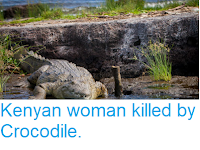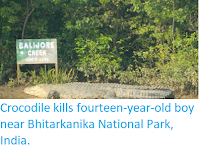A man is recovering in a hospital in Dharwad after being attacked by a Crocodile in the Kali River near the village of Nirmal Nagar in Dandeli District in the Western Ghats of Karnataka State, India, on Friday 7 December 2018. Nagesh Eshwar Ballari,, 43, a day-labourer, was bathing in the river with his wife and son, when he was dragged into the water by the animal. He was found shortly afterwards by a search party made up of local people, Forest Department officials, and a water sports adventure team that was in the area, and taken to the hospital suffering from multiple injuries and severe shock.
Crocodile attacks on Humans are relatively rare, but they are opportunistic ambush predators and will potentially attack anything going close to the water. Saltwater Crocodiles, Crocodylus porosus, the species responsible for almost all attacks on Humans in India, have a particularly poor reputation for such behaviour, being the largest species of Crocodile and notoriously aggressive. These Crocodiles are one of the few Crocodile species not considered vulnerable to extinction, being found from India to Australia and inhabiting many areas that Humans shun, such as Mangrove forests and islands without fresh water. Unfortunately they are also found in rivers in the Indo-Pacific region, where rising Human populations is leading to increasing conflict with many animal species.
See also...
Follow Sciency Thoughts on Facebook.






